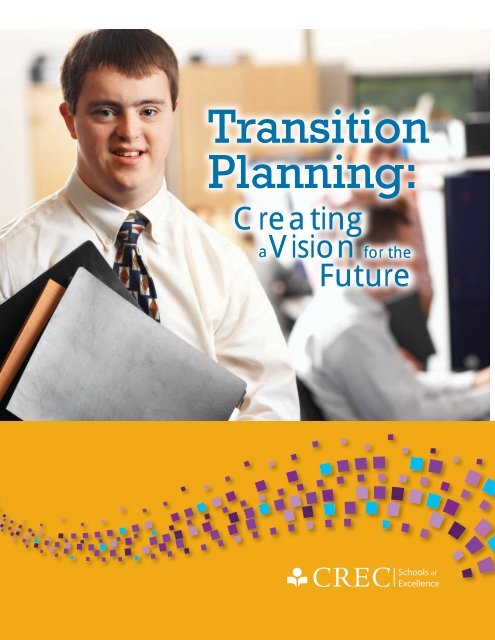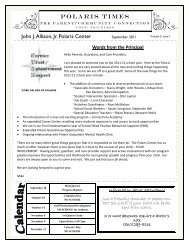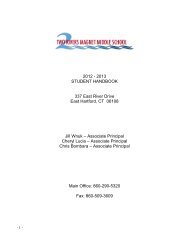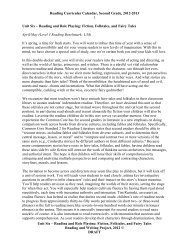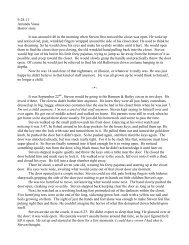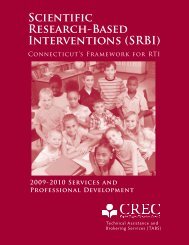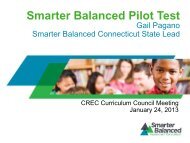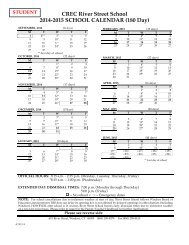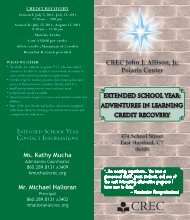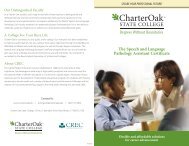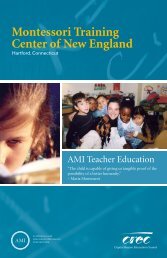Transition Planning: Creating a Vision for the Future
Transition Planning: Creating a Vision for the Future
Transition Planning: Creating a Vision for the Future
Create successful ePaper yourself
Turn your PDF publications into a flip-book with our unique Google optimized e-Paper software.
<strong>Transition</strong><br />
<strong>Planning</strong>:<br />
<strong>Creating</strong><br />
a<strong>Vision</strong> <strong>for</strong> <strong>the</strong><br />
<strong>Future</strong>
<strong>Transition</strong>/Vocational Assessment<br />
Comprehensive, age-appropriate vocational and transition assessments in<strong>for</strong>m <strong>the</strong><br />
development of <strong>the</strong> Individualized Education Program (IEP) and guide transition planning <strong>for</strong><br />
students with disabilities. This process incorporates parent interviews, staff consultations, file<br />
reviews, student interviews, <strong>for</strong>mal and in<strong>for</strong>mal assessments (i.e. interests, abilities, values), and<br />
situational assessments, as appropriate.<br />
SSP/IEPs<br />
Aligning Student Success Plans (SSPs) and Individualized Education Programs (IEPs), and 504<br />
plans and Individualized Healthcare Plans (IHPs), requires careful consideration to ensure<br />
<strong>the</strong> privacy and confidentiality of <strong>the</strong>se legal documents while simultaneously maximizing<br />
opportunities <strong>for</strong> students with disabilities. These opportunities include being integrated<br />
into advisory programs and into <strong>the</strong> SSP process, and opportunities to achieve post-school<br />
outcomes. Guidance is available regarding protecting students’ rights, ensuring successful<br />
transitions, college and career readiness, and quality SSPs aligned with IEPs.<br />
<strong>Transition</strong> Activities & Common Core State Standards<br />
CREC offers assistance with linking proficiency within <strong>the</strong> Common Core State Standards <strong>for</strong><br />
English language arts and ma<strong>the</strong>matics to transition-focused activities. Activities focused on<br />
transition-related skills such as self-advocacy, self-management, knowledge of career options,<br />
and job-specific skills are connected to specific standards within <strong>the</strong> Common Core State<br />
Standards.<br />
<strong>Future</strong>s <strong>Planning</strong><br />
Making Action Plans (MAPS) and <strong>Planning</strong> Alternative Tomorrows with Hope (PATH) are effective<br />
tools in <strong>the</strong> transition planning process. These student-focused, futures planning sessions increase<br />
communication between families and school staff, in<strong>for</strong>m <strong>the</strong> IEP, and create a vision and<br />
action plan <strong>for</strong> <strong>the</strong> future. CREC offers staff to plan and facilitate MAPS & PATH sessions and o<strong>the</strong>r<br />
futures planning models.<br />
Establishing/Evaluating <strong>Transition</strong> and Community-Based Services<br />
CREC’s transition staff can provide technical assistance to support new programming (i.e.<br />
18-21 year old programs) or to evaluate and improve an existing transition program model or<br />
community-based services in your district.<br />
Developing Partnerships <strong>for</strong> Work-Based Learning<br />
Establishing school-business partners is a critical step towards generating work-based learning<br />
opportunities <strong>for</strong> students. CREC can assist with fostering lasting relationships with community<br />
businesses, organizations, and agencies <strong>for</strong> <strong>the</strong> benefit of your students in transition.<br />
Job Coach Training<br />
In order to support districts in preparing paraprofessionals to meet increased demands and<br />
certification requirements, CREC offers COMPASS, a comprehensive job-embedded professional<br />
development curriculum, aligned with National Paraprofessional Standards and developed<br />
specifically <strong>for</strong> paraprofessionals. Customized training programs are also available.<br />
Self-Advocacy & Self-Determination Programs<br />
Fostering self-advocacy and self-determination skills is an important component of transition<br />
planning. Self-determination assessments help determine a student’s aptitude and opportunity<br />
<strong>for</strong> specific components of self-determination such as goal-setting, problem solving, selfadvocacy,<br />
self-evaluation, persistence, and self-confidence, and also provide direction with<br />
targeting goals and objectives on IEPs. CREC can assist staff to foster <strong>the</strong>se skills in your students.
Legal Compliance with CT Department of Labor<br />
Provision of work-based experiences through partnerships with community employers requires<br />
knowledge of, and compliance with, <strong>the</strong> Fair Labor Standards Act and provisions related to<br />
unpaid work experience <strong>for</strong> students with disabilities. CREC staff are available to help you ensure<br />
your work-based learning experiences meet <strong>the</strong>se regulations.<br />
Assistive Technology & <strong>Transition</strong><br />
The Individuals with Disabilities Education Act (IDEA) mandates <strong>the</strong> provision of assistive<br />
technology services and transition services <strong>for</strong> students with disabilities. Integrating assistive<br />
technology into <strong>the</strong> transition planning process can facilitate transition assessment and data<br />
collection while fostering independence and self-determination <strong>for</strong> students with disabilities.<br />
Consultation, training, and technical assistance is available <strong>for</strong> integrating assistive technology<br />
into various models of transition service delivery.<br />
Navigating <strong>the</strong> Adult Service System<br />
As students with disabilities transition from high school, <strong>the</strong>y move from a system of entitlement<br />
under <strong>the</strong> Individuals with Disabilities Education Act (IDEA) to eligibility <strong>for</strong> services under <strong>the</strong><br />
Americans with Disabilities Act (ADA). Consultation, training, and technical assistance is available<br />
<strong>for</strong> developing effective partnerships with state and local adult service agencies to facilitate this<br />
transition.<br />
Student Consultation and Technical Assistance<br />
CREC’s transition staff provide individualized consultation and technical assistance to Local<br />
Education Agencies (LEA)s with regard to transition-aged youth. These services include, but are<br />
not limited to, assessment, job placement, post-secondary planning, family supports, behavioral<br />
supports, and strategies <strong>for</strong> successful transition to <strong>the</strong> real world.<br />
Contact In<strong>for</strong>mation:<br />
Rose McGurkin-Fuhr<br />
<strong>Transition</strong> Resource Counselor<br />
CREC<br />
111 Charter Oak Avenue<br />
Hart<strong>for</strong>d, CT 06106<br />
860-990-1088<br />
rmcgurkinfuhr@crec.org<br />
Elizabeth Battaglia, Ed.D.<br />
Education Specialist<br />
CREC<br />
111 Charter Oak Avenue<br />
Hart<strong>for</strong>d, CT 06106<br />
203-668-2074<br />
ebattaglia@crec.org<br />
CREC does not discriminate on <strong>the</strong> basis of race, color, ethnicity, national origin, religion, gender,<br />
disability, sexual orientation, marital status or genetic in<strong>for</strong>mation.


